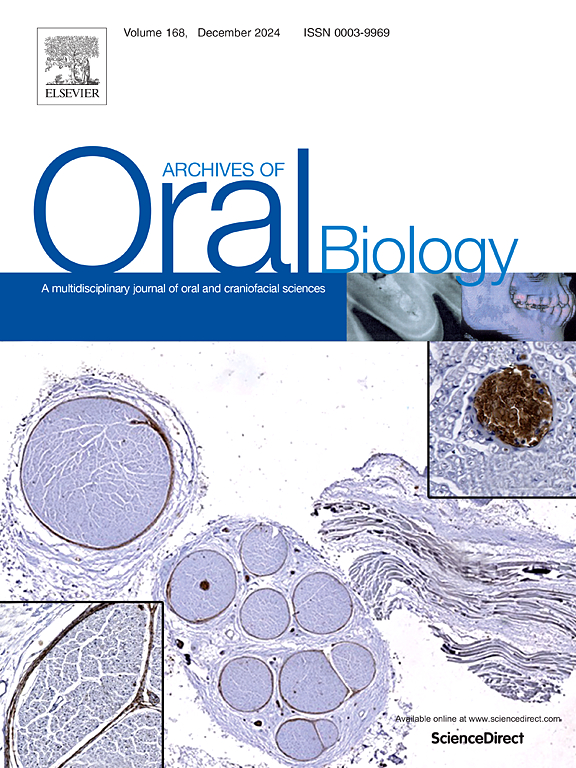The pan-BH-3 mimetic, obatoclax, synergistically enhances cisplatin-induced apoptosis in oral squamous cell carcinoma through a mechanism that involves degradation of the pro-survival protein Mcl-1
IF 2.2
4区 医学
Q2 DENTISTRY, ORAL SURGERY & MEDICINE
引用次数: 0
Abstract
Objectives
The purpose of the study was to elucidate the role of the Bcl-2 family of proteins in mediating cisplatin resistance in oral squamous cell carcinoma (OSCC). The value of the BH3-mimetics venetoclax and obatoclax as sensitisers for cisplatin treatment in OSCC was also evaluated.
Design
In this study the expression levels of a series of pro- and anti-apoptotic members of the Bcl-2 family in paired cisplatin-sensitive (SCC4) and resistant (SCC4cisR) tongue squamous carcinoma cell lines were examined by western blotting. The apoptotic rate induced by cisplatin and BH3-mimetics venetoclax and obatoclax alone or in combination in OSCC was also evaluated by Annexin V/Propidium Iodide double-stained flow cytometric assays.
Results
Obatoclax was shown to synergistically enhance cisplatin-induced apoptosis, and this enhancement was associated with a marked degradation in pro-survival Mcl-1 and upregulation in conformationally active form of pro-apoptotic Bak.
Conclusions
Our study presents novel insights into the relationship between the Bcl-2 family and cisplatin efficacy in OSCC. It also demonstrates that targeted therapy with BH-3 mimetics, such as obatoclax, may represent a new strategy for OSCC therapy.
pan-BH-3模拟物obatoclax通过降解促生存蛋白Mcl-1的机制协同促进顺铂诱导的口腔鳞状细胞癌细胞凋亡
目的探讨Bcl-2蛋白家族在口腔鳞状细胞癌(OSCC)顺铂耐药中的作用。我们还评估了bh3模拟物venetoclax和obatoclax作为顺铂治疗OSCC的增敏剂的价值。本研究采用western blotting检测了一系列Bcl-2家族成员在顺铂敏感(SCC4)和耐药(SCC4cisR)配对舌鳞癌细胞系中促凋亡和抗凋亡的表达水平。采用Annexin V/碘化丙啶双染色流式细胞术检测顺铂与拟bh3药物venetoclax和obatoclax单独或联合应用对OSCC细胞凋亡率的影响。结果sobatoclax显示协同增强顺铂诱导的细胞凋亡,这种增强与促生存Mcl-1的显著降解和促凋亡Bak构象活性形式的上调有关。结论我们的研究为Bcl-2家族与OSCC顺铂疗效之间的关系提供了新的见解。该研究还表明,使用bh3模拟物(如obatoclax)进行靶向治疗可能是OSCC治疗的一种新策略。
本文章由计算机程序翻译,如有差异,请以英文原文为准。
求助全文
约1分钟内获得全文
求助全文
来源期刊

Archives of oral biology
医学-牙科与口腔外科
CiteScore
5.10
自引率
3.30%
发文量
177
审稿时长
26 days
期刊介绍:
Archives of Oral Biology is an international journal which aims to publish papers of the highest scientific quality in the oral and craniofacial sciences. The journal is particularly interested in research which advances knowledge in the mechanisms of craniofacial development and disease, including:
Cell and molecular biology
Molecular genetics
Immunology
Pathogenesis
Cellular microbiology
Embryology
Syndromology
Forensic dentistry
 求助内容:
求助内容: 应助结果提醒方式:
应助结果提醒方式:


